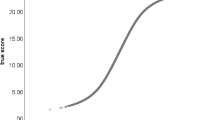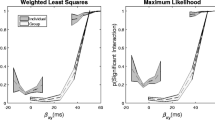Abstract
The concept of cognitive strategies is proposed as a model for the process by which individuals cushion themselves against threats to self-esteem in “risky” situations. Two strategies are discussed. The first is defensive pessimism, an anticipatory strategy that involves setting defensively low expectations prior to entering a situation, so as to defend against loss of self-esteem in the event of failure. The second is an optimistic strategy, where expectations are high at the outset, and post hoc restructuring of the situation is done when the outcome is known. Expectations about performance on an anagram task were collected from prescreened optimistics and defensive pessimists. After completion of the task, subjects were given false failure or success feedback. A posttest measuring self-reported satisfaction, feelings of control, and performance evaluations was administered. As predicted, subjects selected for defensive pessimist attitudes expected to perform significantly worse than did those selected for optimistic attitudes, even though there was no difference in actual performance. Moreover, optimists demonstrated attributional egotism in claiming significantly more control over their performance in the success condition than in the failure condition. Pessimists did not show this pattern. The data provide evidence of post hoc cushioning efforts among optimists, whereas defensive pessimists seem to be cushioned by their initial structuring of the situation. It is argued that these strategies can be understood as motivated attempts to solve the “problem” of a “risky” situation.
Similar content being viewed by others
References
Alloy, L. B., & Abramson, L. Y. (1979). Judgment of contingency in depressed and nondepressed students: Sadder but wiser?Journal of Experimental Psychology: General, 108 441–485.
Atkinson, J. W., & Litwin, G. H. (1960). Achievement motive and test anxiety conceived as motive to approach success and motive to avoid failure.Journal of Abnormal and Social Psychology, 60 52–63.
Cantor, N. (1984).Social intelligence and life tasks. Invited paper presented at the 56th Annual Meeting of the Midwestern Psychological Association, Chicago.
Cantor, N., & Kihlstrom, J. F. (1985). Social intelligence: The cognitive basis of personality. In P. Shaver (Ed.),Review of personality and social psychology. Beverly Hills: Sage.
D'Zurilla, T. J., & Goldfried, M. R. (1971). Problem solving and behavior modification.Journal of Abnormal Psychology, 78 107–128.
Goldfried, M. R. (1979). Anxiety reduction through cognitive-behavioral intervention. In P. C. Kendall & S. D. Hollon (Eds.),Cognitive-behavioral interventions: Theory, research, and practice. New York: Academic Press.
Goldfried, M. R., Padawer, W., & Robbins, C. (1984). Social anxiety and the semantic structure of heterosocial interactions.Journal of Abnormal Psychology, 93 87–97.
Greenwald, A. G. (1980). The totalitarian ego: Fabrication and revision of personal history.American Psychologist, 35 603–618.
Greenwald, A. G. (1982). Ego-task analysis: An integration of research on ego-involvement and self-awareness. In A. Hastorf & A. Isen (Eds.),Cognitive social psychology. New York: Elsevier.
Higgins, E. T., McCann, C. O., & Fondacaro, R. (1982). The “communication game”: Goaldirected encoding and cognitive consequences.Social Cognition, 1 21–37.
Jones, E. E., & Berglas, S. (1978). Control of attribution about the self through self-handicapping strategies: The appeal of alcohol and the role of under-achievement.Personality and Social Psychology Bulletin, 4 200–206.
Kelly, G. A. (1963).The psychology of personal constructs. New York: Norton. (Original work published 1955.).
Kihlstrom, J. F. (1984).Personality as social intelligence: Understanding structures and social interactions. Invited paper presented at the 56th Annual Meeting of the Midwestern Psychological Association, Chicago.
Kihlstrom, J. F., & Nasby, W. (1981). Cognitive tasks in clinical assessment: An exercise in applied psychology. In L. Berkowitz (Ed.),Advances in experimental social psychology (Vol. 17). New York: Academic Press.
Kuhl, J. (1984). Volitional aspects of achievement motivation and learned helplessness: Toward a comprehensive theory of action control. In B. Mahrer (Ed.),Progress in experimental personality research (Vol. 13). New York: Academic Press.
Kuiper, N. A. (1978). Depression and causal attribution for success and failure.Journal of Personality and Social Psychology, 36 236–246.
McFall, R. M. (1982). A review and reformulation of the concept of social skills.Behavioral Assessment, 4 1–33.
Meichenbaum, D. (1977).Cognitive behavior modification: An integrated approach. New York: Plenum Press.
Mischel, W. (1973). Toward a cognitive social learning reconceptualization of personality.Psychological Review, 80 252–283.
Nisbett, R., & Ross, L. (1980).Human inference: Strategies and shortcomings of social judgment. Englewood Cliffs, New Jersey: Prentice-Hall.
Showers, C., & Cantor, N. (1984).Optimism and defensive pessimism: Cognitive strategies for risky situations. Unpublished manuscript, University of Michigan.
Spivak, G., Platt, J. J., & Shure, M. B. (1976).The problem solving approach to adjustment. San Francisco: Jossey-Bass.
Tetlock, P. E., & Levi, A. (1982). Attribution basis: On the inconclusiveness of the cognitionmotivation debate.Journal of Experimental Social Psychology, 18 68–88.
Turk, D. C., & Salovery, P. (1985). Cognitive structures, cognitive processes, and cognitive-behavior modification: I. Client issues.Cognitive Therapy and Research, 9 1–17.
Weiner, B. (1965). The effects of unsatisfied achievement motivation on persistence and subsequent performance.Journal of Personality, 33 428–442.
Weiner, B., & Kukla, A. (1970). An attributional analysis of achievement motivation.Journal of Personality and Social Psychology, 15 1–20.
Author information
Authors and Affiliations
Additional information
The authors would like to thank Aaron Brower, Nancy Genero, Hazel Markus, Paula Niedenthal, Carolin Shower, Steve Hollon, and two anonymous reviewers for their helpful comments on earlier drafts of this paper.
Rights and permissions
About this article
Cite this article
Norem, J.K., Cantor, N. Anticipatory and post hoc cushioning strategies: Optimism and defensive pessimism in “risky” situations. Cogn Ther Res 10, 347–362 (1986). https://doi.org/10.1007/BF01173471
Issue Date:
DOI: https://doi.org/10.1007/BF01173471




